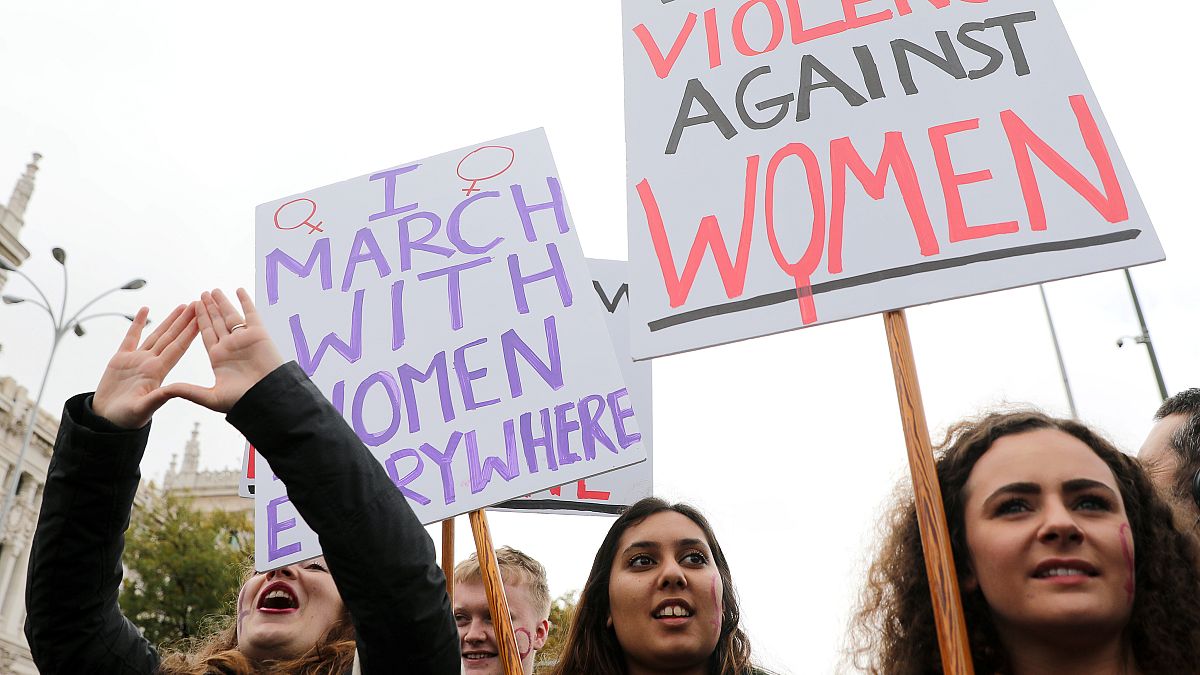Ahead of the International Day of Violence against Women on November 25, Euronews takes a look at the statistics on the issue.
The 131st femicide in France was met with outrage in the country as the victim’s daughter spoke about witnessing her mother’s murder.
"They had been together for three or four years. It’s been three to four years that she’s been beaten up. She never wanted to talk about it out of fear," Stella, the victim’s daughter said in an interview with a local radio station in eastern France.
The young woman said that she arrived too late to the scene and witnessed her mother Sylvia’s last moments as the 40-year-old woman’s boyfriend stabbed her to death.
“It’s all well and good to file a complaint, but it doesn’t help,” Stella said, recounting the steps her mother took to alert authorities before she was killed. Stella said the police arrived too late.
Just two days prior a 34-year-old woman died in Levallois-Perret, a suburb of Paris, after she was strangled by her partner and the day after Sylvia's death, a mother of three was strangled by her ex, according to a report in Le Parisien.
It comes as the conversation about violence against women has been brought to the forefront of the country's political debate, with the government in the midst of consultations on the topic.
The debate is set to end on the International Day for the Elimination of Violence against Women on November 25. Euronews will be covering domestic violence and violence against women in a series of stories on the topic this week.
A global phenomenon by the numbers
An estimated 35% of women worldwide (around one in three women) have experienced domestic or sexual violence.
It’s a percentage that many experts find staggering, saying it reveals a global crisis of violence against women.
"I find it very sad that in every society we have violence against women. In every society," said Marceline Naudi, the President of the Council of Europe's Group of Experts on Action against Violence against Women and Domestic Violence (GREVIO).
"I don’t think that we can say some societies are worse than others because sadly that one in three, one in four [statistic] holds almost everywhere," she added.
Evelyn Regner, the chair of the European Parliament's Committee on Women's Rights and Gender Equality, said the figure was "incredible".
"One out of three and it might be even higher, the figure, because a lot of experiences are not reported," she said.
Many women have recently protested, citing numbers of reported femicides - the killing of women on account of gender.
Fifty-eight per cent of the 87,000 women intentionally killed in 2017 were killed by intimate partners or family members, according to the United Nations. More than a third of women intentionally killed were killed by a former or current intimate partner.
“While the vast majority of homicide victims are men, killed by strangers, women are far more likely to die at the hands of someone they know,” writes Yury Fedotov, the executive director of the UN Office on Drugs and Crime.
The highest numbers of femicides are in Africa and the lowest rate is in Europe where 0.7 women were killed per 100,000 by a partner or family member.
Few Europe wide statistics on the topic
The percentages of women who say they are have experienced violence are even higher in eastern and southeastern European countries where 70% of women say they have experienced some form of violence since turning 15.
Forty-five per cent of women interviewed said they experienced at least one form of sexual harassment and 21% said they experienced "physical, sexual or psychological violence during childhood".
The survey - released by the EU's external action service - highlighted violence against women in Albania, Bosnia and Herzegovina, Kosovo, Montenegro, North Macedonia, Serbia, Moldova and Ukraine.
But the survey is one of the few comprehensive studies on the topic.
The last EU-wide survey was undertaken in 2014, in which the European Agency for Fundamental Rights surveyed 42,000 women across the bloc.
The survey echoed global figures, stating that one in three women in the EU had experienced some form of physical and/or sexual assault since the age of 15.
"What emerges is a picture of extensive abuse that affects many women’s lives but is systematically underreported to the authorities. The scale of violence against women is therefore not reflected by official data," the agency wrote in a statement.
"States should be more vigilant in collecting data and sharing this so we can have a more accurate understanding about the scale of the problem," said Alexandra Patsalides, a lawyer and programme officer at NGO Equality Now.
"This requires a better system of data collection, the availability of more disaggregated data, and information sharing among different agencies and duty bearers to ensure no one falls through the cracks."
A changing conversation
But in the time since that survey, a lot has changed.
In 2017, dozens of women accused Harvey Weinstein, an American film producer, of sexual harassment, assault or rape. The reporting released in the NY Times and New Yorker soon became a viral movement in which women called out individuals for sexual harassment worldwide.
All over the world, women have recently demonstrated in over femicide rates, domestic violence, and sexual harassment. Hundreds of women staged a die-in in Paris last month and thousands of women in Madrid protested after a group of men were acquitted after gang-raping a teenager.
And the numbers of reported incidents have been going up, which experts say is a positive development.
"In terms of numbers what we can say is that although reports in relation to violence against women are going up generally, this normally indicates that women are more ready to come out and to say [they] don’t deserve this kind of treatment," Naudi said.
The French government said it had issued at least 700 fines for street harassment back in August, after passing a law last year that outlaws harassment. But the law has come under criticism for resulting in minor fines for larger crimes.
France is now consulting on a plan to tackle domestic violence and plans to issue suggestions on the topic on November 25 for the Day for the Elimination of Violence against Women.
But not all countries are addressing the issue.
Seven EU members have still not ratified the Istanbul Convention, a Council of Europe treaty on preventing violence against women and domestic violence. They are Hungary, Bulgaria, Latvia, Lithuania, the Czech Republic, Slovakia, and the United Kingdom.
"Only 21 member states have ratified. So somehow there is just a couple of countries lacking behind, and it seems there is huge resistance, and this is really something alarming," said European parliamentarian Regner.
"What we as European Parliamentarians can do insisting that the Istanbul Convention is ratified and also demanding a strategy what can be done in order to prevent violence against women beforehand."
Consent remains a problematic issue in many legal systems across Europe, Equality Now told Euronews.
"Spain, Finland, and France all lack legal recognition that sex without consent is rape. Requiring rape survivors to prove they were subjected to violence or threat, or that they resisted their attacker, is contrary to international human rights standards," Patsalides told Euronews.


